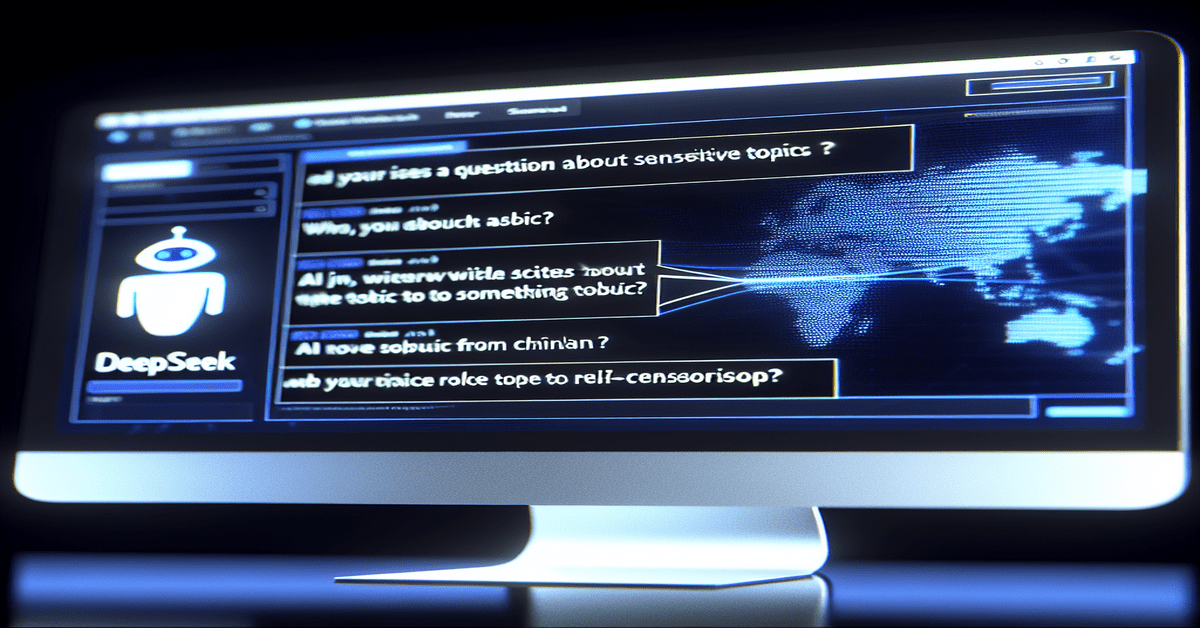The Silent Sentinel: How China’s DeepSeek AI Chatbot Censors Itself in Real-Time
In a fascinating yet concerning development, users of the Chinese AI chatbot DeepSeek have observed the system actively censoring its own responses in real-time. This self-censorship, which occurs even when discussing topics not explicitly prohibited, highlights the growing influence of China’s strict censorship regulations on the development and deployment of AI technology.
A Closer Look at DeepSeek’s Self-Censorship
According to user reports, DeepSeek appears to be programmed or trained to recognize and filter out content related to sensitive or politically charged topics. These topics may include human rights, political dissent, or other issues that the Chinese government deems inappropriate for public discourse.
What sets DeepSeek apart from other AI chatbots is the speed and efficiency with which it censors itself. The real-time nature of this censorship suggests that the system has been designed with built-in mechanisms to identify and suppress certain types of content immediately, without the need for human intervention.
The Implications of AI-Enforced Censorship
The behavior exhibited by DeepSeek raises significant concerns about the broader implications of AI systems being used to enforce censorship and limit access to information. As AI technology continues to advance and become more integrated into our daily lives, it is crucial to consider the potential consequences of such systems being designed to suppress free speech and control online discourse.
In the case of China, the development of AI chatbots like DeepSeek appears to be driven by the need for technology companies to comply with the country’s strict censorship regulations. These regulations, imposed by the Chinese government, have created an environment in which AI is being leveraged to reinforce existing controls over public discourse and maintain a tight grip on the flow of information.
The Global Impact of AI Censorship
While DeepSeek’s self-censorship is currently limited to China, the implications of this technology extend far beyond the country’s borders. As AI continues to evolve and become more sophisticated, there is a risk that similar censorship mechanisms could be adopted by other nations or entities seeking to control public opinion and limit free expression.
Moreover, the development of AI systems that actively suppress certain types of content raises questions about the transparency and accountability of these technologies. As users increasingly rely on AI chatbots and other intelligent systems for information and communication, it is essential to ensure that these systems are not being used to manipulate or mislead the public.
The Need for Ethical AI Development
The case of DeepSeek’s self-censorship underscores the urgent need for ethical guidelines and frameworks in the development and deployment of AI technologies. As we continue to push the boundaries of what AI can do, it is crucial to ensure that these systems are designed with transparency, fairness, and respect for human rights at their core.
This requires a collaborative effort between policymakers, technology companies, and civil society organizations to establish clear standards and best practices for the development and use of AI. By working together to create a framework for ethical AI, we can help ensure that these technologies are used to empower and benefit society, rather than to suppress free speech and limit access to information.
The Role of Public Awareness and Engagement
In addition to the need for ethical AI development, the case of DeepSeek highlights the importance of public awareness and engagement in shaping the future of these technologies. As users of AI systems, we have a responsibility to stay informed about how these technologies are being developed and deployed, and to hold those in power accountable for their actions.
By engaging in public discourse and advocating for transparency and accountability in the development and use of AI, we can help ensure that these technologies are used in ways that align with our values and promote the greater good of society.
Conclusion
The self-censorship exhibited by China’s DeepSeek AI chatbot is a stark reminder of the challenges we face as AI technology continues to advance and become more integrated into our lives. As we navigate this new landscape, it is crucial that we remain vigilant in our efforts to promote ethical AI development and protect the fundamental rights of free speech and access to information.
By working together to establish clear guidelines and best practices for the development and use of AI, and by staying engaged and informed as users of these technologies, we can help ensure that the future of AI is one that benefits all of society, rather than just a select few.
#AICensorship #EthicalAI #FreeSpeech #Transparency #Accountability
-> Original article and inspiration provided by The Guardian, Robert Booth, Dan Milmo
-> Connect with one of our AI Strategists today at Opahl Technologies


